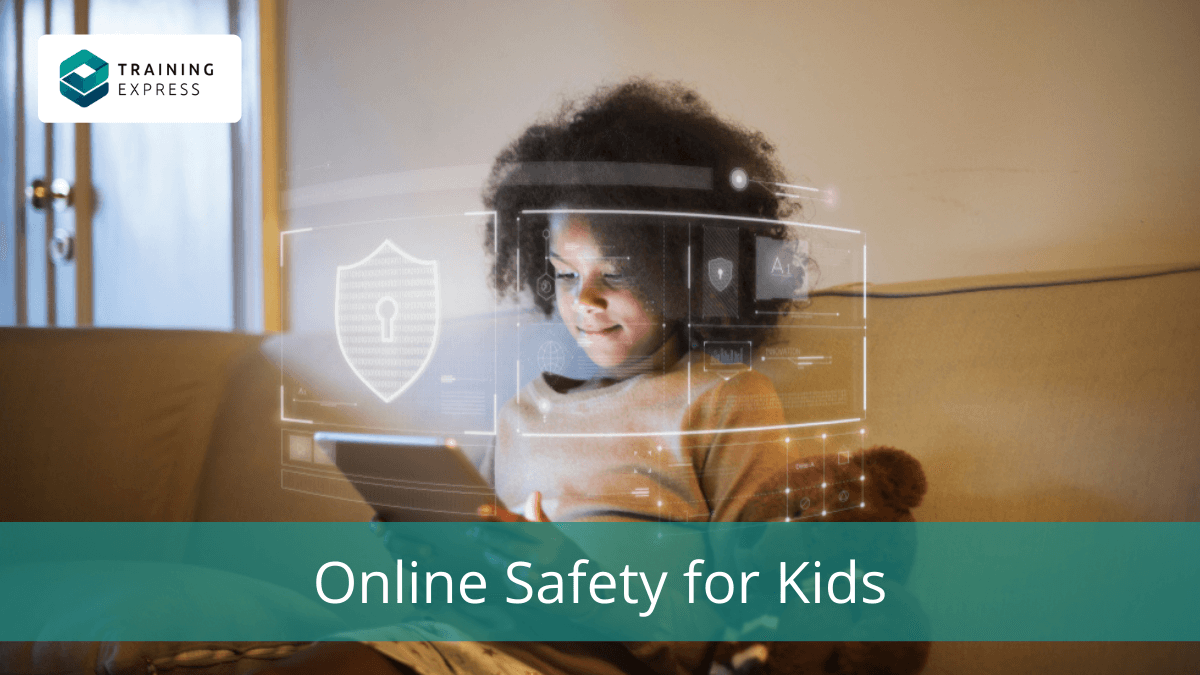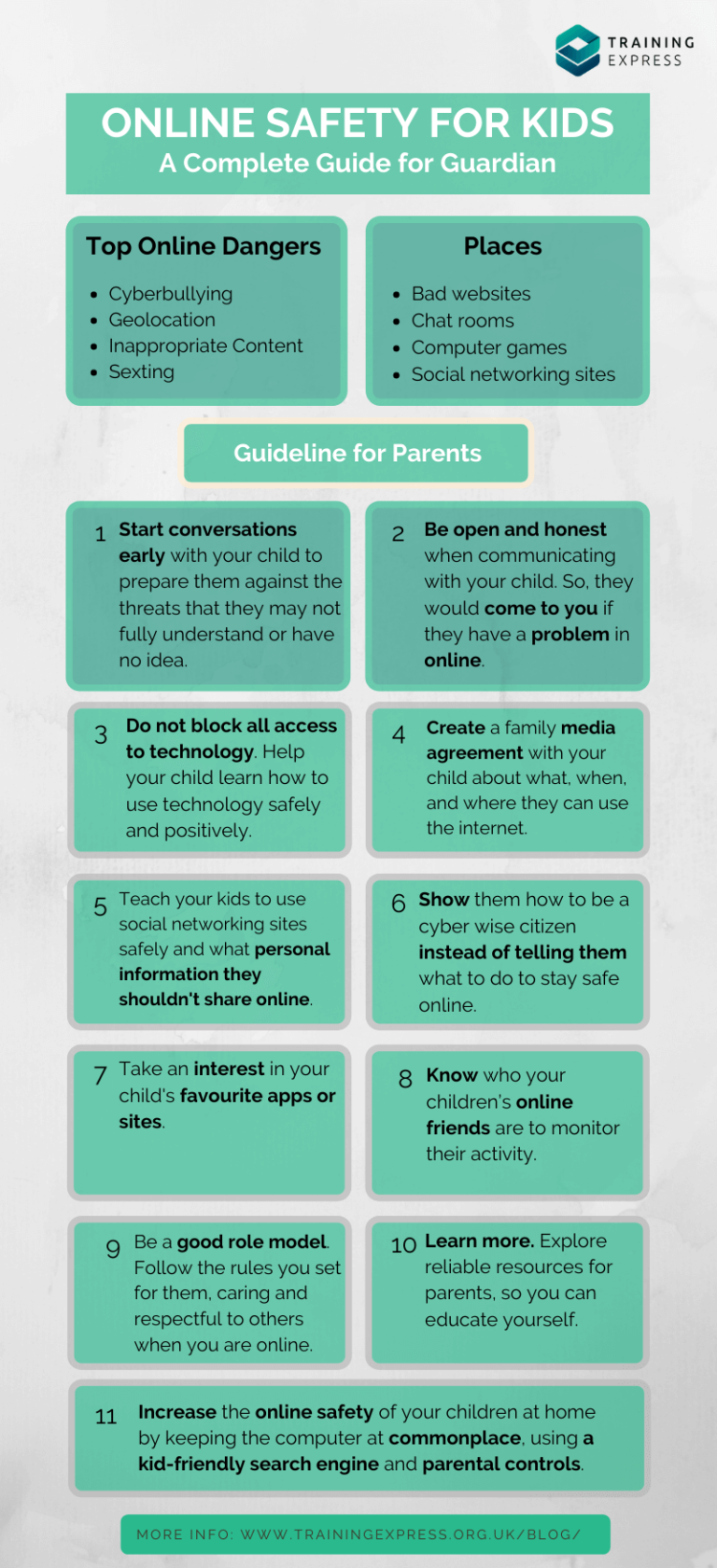
The Internet has opened a new world and many opportunities for a lot of people around the globe. People are using the internet every day and considered it a wonderful place to learn, shop, play games, and talk to your friends.
Most of the kids think that the internet is a magical place where they can find answers to any obscure questions and watch and learn from videos and tutorials. Unfortunately, there are also people who may try to harm you and your kids, such as predators, identity thieves, and others online.
Kids often don’t think about the consequences of their actions, which can lead to sharing too much information about themselves on the internet. Cyberbullies or predators sometimes target kids specifically to bully and harm them. To be safe online, you and your kids must be aware of the dangers.
Online Dangers
Most kids and teens say they know and are aware of how to stay safe online. However, there are quite a few reasons why children are often at greater risk when they are online. They don’t have enough knowledge about viruses, online privacy, phishing, social networking etiquette and any internet security and/or security issues.
Understanding online dangers

You will need to know about the different types of online dangers that exist to keep your kids safe from the predators. The risks you need to be aware of are –
- Cyberbullying (Harassing, threatening, embarrassing, or targeting another person on the internet)
- Geolocation (The user’s location can be found from any device connected to the Internet)
- Inappropriate Content (Material that is disturbing, improper and not normal for children to see, such as pornography or violent images)
- Sexting (Using the smartphone or internet to send, receive, or forwarding sexually explicit photos)
There is also a risk of eye strain, wrist strain, and other injuries when they are using electronic devices for a long time. This does not mean that your child will encounter all of these threats. However, having an in-depth understanding of the risks can help you, and your kids make smart decisions online.
Places where dangers can occur
Kids need to be smart and careful while on the internet because online dangers are not limited to bad websites. Nowadays chat rooms, computer games and even social networking sites can be risky and are posing a great danger to your young children. If your kids have a mobile phone, they also need to be cautious when chatting or browsing the internet on their phone.

Guidelines for keeping your kids safe online
It is impossible to keep your kids completely safe online. Even if you set up parental controls on your home computer, your children will use many computers that do not have parental controls. The only way to keep your kids safe is to teach them to make good decisions online, even when you’re not around.
Here are some general tips you can follow to teach your kids about online safety:
1. Start conversations early
The best time to start a conversation with your child when they start to do anything that involves the Internet. By starting a conversation with your child about online safety, you will be preparing them against the threats that they may not fully understand or have no idea.
If your child has already started using a computer or tablet, it is not too late to talk with them about internet safety. Continue the conversation as soon as possible. As it takes time for children to develop good internet safety habits, be sure to have regular conversations to help build a strong foundation for keeping your child safe online.
02. Be open and honest
You need to be open and honest while communicating is the key to establishing trust with your child. Talk regularly with your child about their favourite websites and apps and what they are enjoying online. Always be supportive and always listen with an open mind.
You should have a discussion with your child if you learn that your child has done something online that is inappropriate. Listen to what he/she has to say and be honest about the reasons why you think what he or she has done is inappropriate. At the same time, discuss what he or she can do to stay safe online. If you keep the line of communication open with your child, they are more likely to come to you if they have a problem online in the future.
03. Don’t ban your child from using technology
The media is full of scary stories about how it is risky to use the internet at a young age. But it is important not to let potential problems prevent your child from using technology for their education and personal interest. We live in a digital world, and it’s not going to change at any time.
We need to remember that technology can enrich our lives in many ways when it is used for a good purpose. So instead of banning them from using technology, you should teach them how to use the internet safely and positively. The risk can be reduced when you and your child agree on the same rules regarding safe internet use. Read on!
04. Establish rules but exercise flexibility
You should set some rules for your child about what they can and cannot do online. It is very important to make rules for your children so that they know what is expected of them. Prepare guidelines in advance and don’t wait until something bad happens to them.
Involve your child in the decision-making process when setting the ground rules for their Internet use. It builds trust and ensures that the rules are achievable for them, allowing them to take better ownership of their safety online. As your child gets older, the way they use the Internet will change. You should exercise flexibility and make adjustments to rules to ensure that they remain relevant and age-appropriate.
For example, as the child grows older, their internet use will be increased due to the extra homework, and it may be difficult to set a time limit on their internet usage. Consult with them and set a flexible schedule so that he or she may use the internet for specific purposes.
05. Create an internet safety contract
Once you have established Internet guidelines, you may want to put them in writing so that they can follow the rules. You can create an Internet safety agreement your kids can sign in there. Then you should keep a copy of it near the computer.
06. Help your child learn about privacy and social media
Teach your kids to keep personal information private while they’re online. Posting personal information online, such as phone numbers, addresses, and credit cards, is usually a bad idea. Criminals can harm you or your family if they have access to this information.
You should also teach your kids how to use social networking sites safely. There are some social sites such as Facebook, Instagram that allow kids and adults to share their own photos and videos as well as chat with friends and strangers. Even if your child shares something with friends, there is a high chance that personal information could get into the wrong hands. Tell them that they should only post something online if they’re comfortable with everyone in the world seeing it. Otherwise, they shouldn’t share it on social media.
07. Don’t just tell, show them
Children like to imitate, they often follow what they see, instead of what they are told. You can use presentations and examples to help them have a better understanding of how to stay safe online.
For example, you can explore the internet and watch your child’s favourite websites together, and demonstrate how your child can create strong passwords using the different letters, numbers and symbols for these websites.
Explain to them why they should use different passwords for each account and the possible consequences of not doing so. You can also help your child learn about Internet safety in a fun way using online educational games.
08. Minimise risks at home
If you have a home computer that your kids use, you can take some extra precautions to make your computer child-friendly. Keep in mind that your kids will probably use many other computers (at school or friends house) and these precautions won’t keep them safe when they’re not at home.
Also, keep in mind that these are basic suggestions; Depending on your parenting style and the age of your children, you may choose not to use them at all. These suggestions are:
- Keep the computer in the living room or another common area.
- Install antivirus software.
- Use a kid-friendly search engine. (Example: KidTopia and KidRex.org).
- Use parental controls.
- Know who your children’s online friends are.
As adults, we often come across impostors online, and we can quickly identify them. However, if children are not taught how to use the Internet safely from an early age, they will be intimidated by who they are chatting with.
You should become friends and contacts within your child’s social media circles, which will help you monitor their activity. If your children resist, you should tell them that this is one of the conditions for allowing access to the Internet.
09. 8. Be a good role model
Children learn by watching and imitating others adults behaviour around them. Therefore, parents have the strongest influence on shaping a child’s behaviour. Show your child that you are complying with the rules that you have established for them. You are also careful and respectful to others when you are online. This type of behaviour encourages them to imitate and follow the rules.
Educate yourself and teach your kid
Learn all you can about the Internet. Being familiar with the Internet will help you understand the risks and how to communicate with your children. You can teach your children –
01. To use their smartphones responsibly
Another opportunity to discuss safety online is when you decide to give your child a smartphone for the first time. There are many benefits to having a smartphone, but smartphones bring extra risk to your child.
Make sure your child understands that the smartphone is for their personal use and that no one else should use it. Tell them by sharing their phone with another person would allow others to impersonate them online and damage their reputation if someone sends or posts an inappropriate text, comment or photo. Here are some essential tips you can give and understand:
- Set rules. Set a guideline for them when and how long they can use their smartphone.
- Help them set up password protection.
- Make sure the device is running on the latest operating system. Tell them to update the smartphone operating system regularly.
- Tell your child that they can’t download new apps without your approval.
- You should check what software they are using and understand what the app does and review its privacy policy to protect your child’s privacy.
- Talk about phone location services. When posting online from the phone, GPS can give away your child’s location. So, teach them how to disable location services for photos and other posts while still using GPS for maps.
02. What you should know about your kids and online gaming
Nowadays, online gaming is considered as a social activity for the kids. It allows them to play with or against anyone around the world from their own home. The player can be connected to chat, text, headset, microphone or video camera. Players often trash-talk when playing an online game, this can be a part of that experience, but make sure it doesn’t go too far.
Taking an active interest in your child games can help you understand how they’re played and why your kids like them. Also, they can help you understand what you can do to keep your kids safe while gaming.
Here are some essential on how to keep your child safe in online gaming
- Set rules about when and how long your child is allowed to play.
- Tell your child to never share personal information like name or address while gaming.
- Check the game rating to see if it is suitable for your child's age.
- Play the game before you let them play it.
- Sit down with your child and be aware of the locations and people that they are playing games with.
- Tell them and make sure that they cannot purchase any online gaming without your permission.
- Check if the game has moderators or features so that you can report inappropriate behaviour.
- Keep gaming equipment in a common place where you can monitor what they are playing.
- Know the safety features of the game and equipment and set safety features and parental control options on the gaming gear.
03. Teaching your child how to use social media safely
You can understand the content and connections they’re exposed to in social media by having a better grip of the sites your teens frequently visit. To keep an eye on their social media activity, you can follow or friend them on these sites.
Here are some essential tips for Teen Safety on Social Media:
- Don’t post any inappropriate picture or comment on the internet.
- Tell them they should avoid posts related to drugs and alcohol, or those featuring nudity, bigotry, violence or threats.
- Tell your kids to make a deal with their friends that none of you will post any comments or pictures that will hurt each other.
- They should block anyone who posts harassing, threatening or inappropriate comments about them and report them to the app.
- Always read the software review on the internet before downloading the app on your device. Check what permissions are asked by the apps.
- Be aware of the new friends you are meeting through social media. Remember that not all people have good intentions, and they are trying to get something from you.
- Don’t talk about sex with strangers. They may not be the person who their profile says they are. If sexual comments continue, they should contact the police or report it to CyberTipline.com.
- Don't agree to meet anyone offline who you've only met on social media.
Closing Note
All in all, technology is improving our lives in many ways. We can do the tasks which were previously considered inconceivable and now can be carried out with ease. We have more power than ever before to connect, learn, and grow from the internet.
Furthermore, we should give our children access to modern technology and the internet at an early age. So, they can learn how to be a cyber citizen and know all the online dangers.
However, you should remember that you are not careful, technology can compromise your children’s basic developmental needs. For instance, sleep, relationships, exercise, nutrition, and play.
The best one parents can do is learn everything about online safety and related dangers caused by the internet.
Cheers! Have a good day.
Child Protection and Risk Assessment
Child Protection and Risk Assessment
- Available Courses
- Animal care10
- Design36
- Training10
- Accounting & Finance Primary51
- Teaching & Academics Primary37
- Teaching23
- Quality Licence Scheme Endorsed181
- Law10
- IT & Software234
- Job Ready Programme52
- Charity & Non-Profit Courses28
- HR & Leadership4
- Administration & Office Skills6
- Mandatory Training36
- Regulated Courses4
- AI & Data Literacy29
- Health and Social Care291
- Personal Development1651
- Food Hygiene119
- Safeguarding81
- Employability288
- First Aid73
- Business Skills298
- Management425
- Child Psychology41
- Health and Safety537
- Hospitality28
- Electronics30
- Construction63
- Career Bundles201
- Marketing39
- Healthcare174
 Food Hygiene
Food Hygiene Health & Safety
Health & Safety Safeguarding
Safeguarding First Aid
First Aid Business Skills
Business Skills Personal Development
Personal Development
